The December core update was a quick one, running from December 12-18, 2024. Following this, Google launched a surprise spam update only days after the core update finished. It ran from December 19-26.
There are many comments on Barry Schwartz's article on the spam update with site owners reporting significant declines in traffic. Some are saying they are seeing spam sites improve above them. In the time I have spent so far analyzing sites I monitor, I have not yet found one that looks to me like it was impacted by the spam update. I do think some have been impacted by December core, however. I will update this post if I find more cases worth reporting on.
This is a horrible time for an update as many sites will naturally see traffic fluctuations at this time due to people changing their search activity over the holidays.
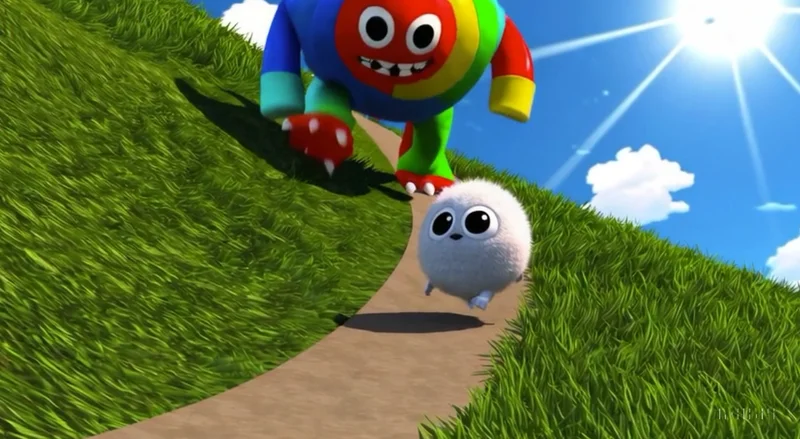
How to tell if the December core / spam updates impacted you
It will be difficult for most sites to definitively say whether these updates have impacted you. I am quite certain that many of you who are reading this are despairing right now because your traffic has dipped in conjunction with the rollouts of these updates. However, my bet is that most of you have not been specifically impacted by these updates.
Here are some steps you can take to get a better idea of the impact:
1. Is there an obvious drop that lines up with the start of an update?
While an update can impact a site at any time in the update, in the vast majority of cases I have examined, the impact is felt on day one. This means we are looking for a drop that starts on one of these days. Or, possibly during the span of the rollout.
- December 12 - 18: core update
- December 19 - 26: spam update
In either GA4 or GSC, put your cursor on those dates, is it clear that traffic starts to and continues to decline at this time?
It’s not always easy to tell though. For example, does this site drop in conjunction with the December 19 spam update? It’s quite a big drop.
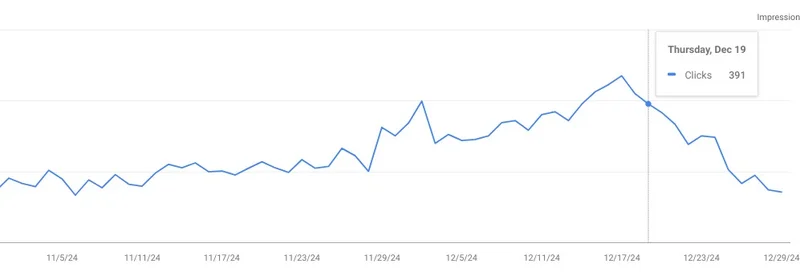
2. How does this drop compare to the previous year?
When looking at the 16 month view of traffic in GSC, this site had a similar pattern the previous year.
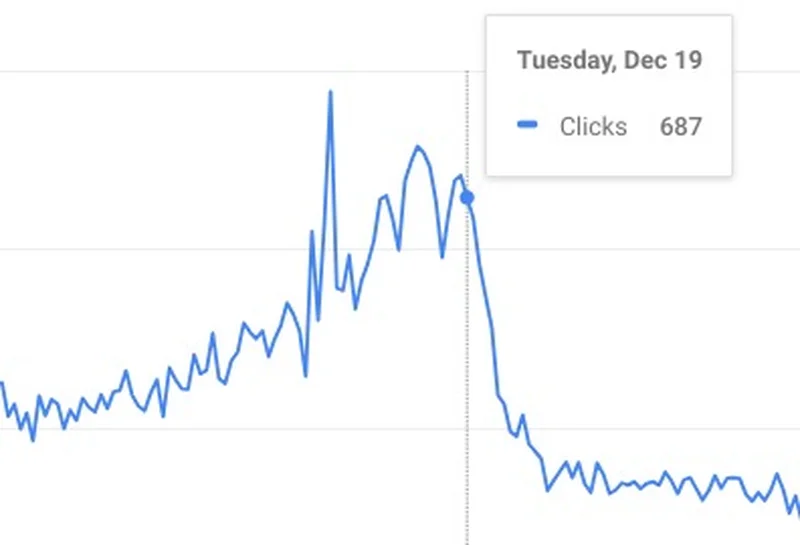
The reason for this is that it’s a site that sells a product that is very popular for Christmas and needs to be shipped. Within a week of Christmas each year, the sales naturally tend to plummet.
If you’re still not sure though, you can proceed to step #3.
3. Have keyword rankings dropped?
Historically, tools like Ahrefs and Semrush have been my go-to in assessing keyword rankings. However, I have found that in the last few months they do not always reflect what is happening. Both tools are way off for this site, barely showing a decline in traffic at all.
Instead, I’d recommend using my scatter plot GPT which looks at your keyword data from GSC. It’s not perfect as no matter how you prompt it it confuses the colour of lost and newly gained keywords along the axes. But it is good at plotting the previous vs current ranking of each keyword. It uses Python to do this, so I have not found hallucinations. The goal is to see if, overall, keywords have improved or declined in rankings.
If you are strongly negatively impacted by an update, you should see a lot more red x’s above the line than green ones below.
In GSC I compared the time since the update to the previous period.
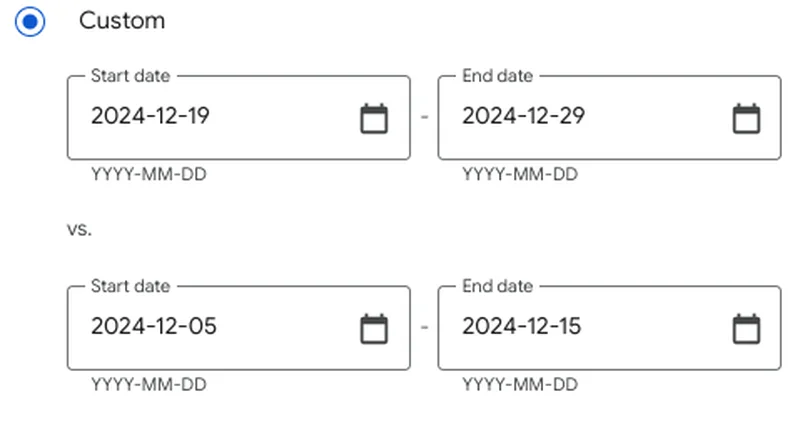
Then I exported the data and shared the queries CSV with my scatter plot GPT. You can see that there are actually more improved keywords than worsened, although only marginally.
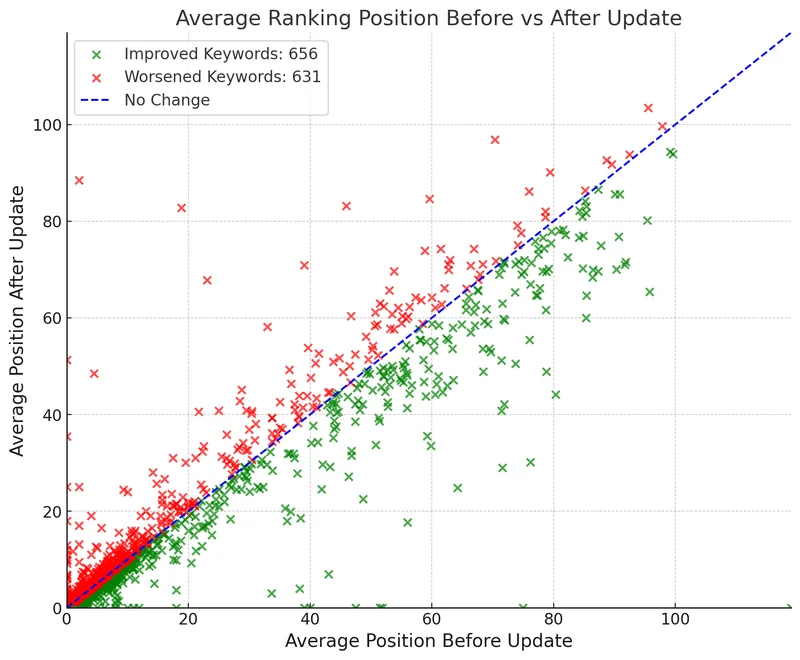
This site likely was not affected by the spam update but rather is going through seasonal changes.
Some cases are difficult
Here is another case that shows just how difficult analysis of this update can be. If we go through the steps above, we can see that it appears to be impacted on both December 12 AND the 19th.
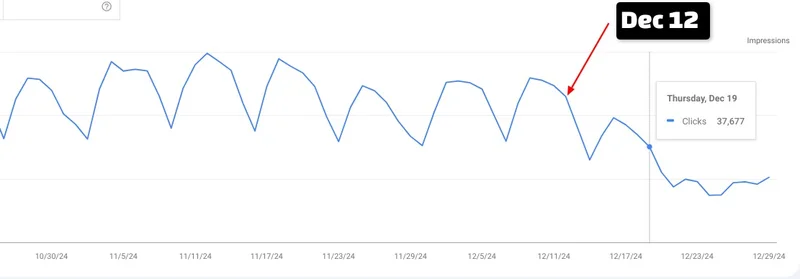
We can also see, however that a similar pattern happened in the previous year.
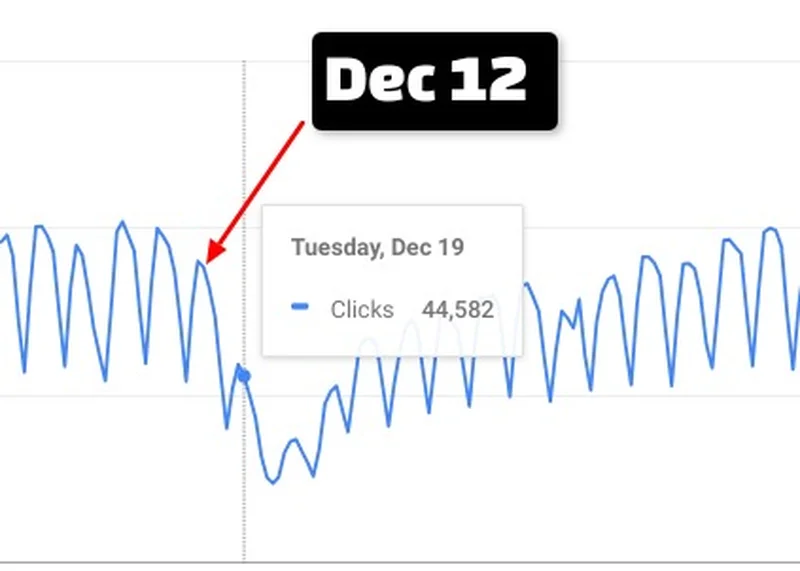
In this case, the scatter plot shows a different story. Can you see how there is much more red in this one than the previous?
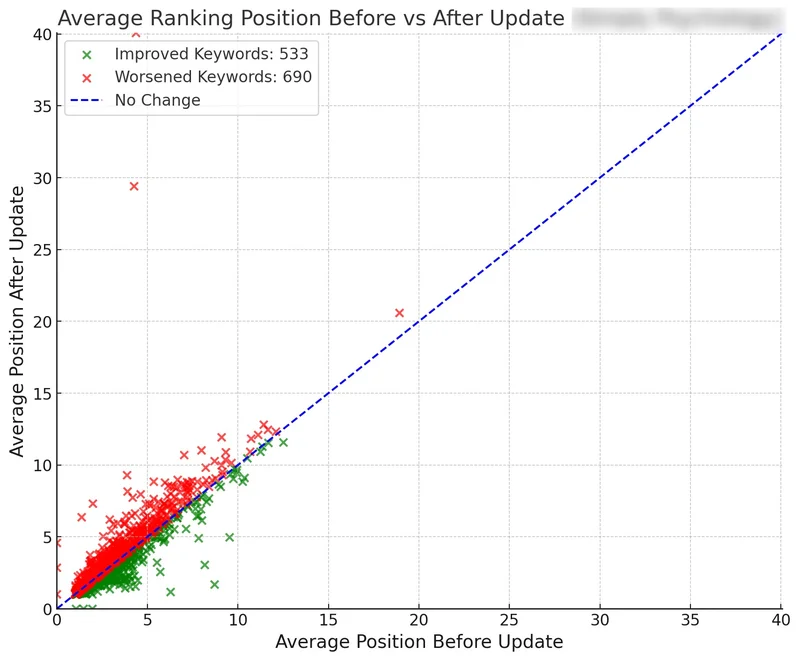
There are definitely more worsened keywords than improved. Usually though, when a Google update strongly impacts a site, it is even more obvious than this.
I asked ChatGPT, make me a list of keywords that have worsened by more than one position, sorted by impressions.
Then, one by one I searched several of these keywords, looking for clues. A very obvious one stood out to me. The vast majority of keywords for which this site ranks are now displaying an AI Overview. This naturally will change user behaviour as many of those who are looking for a quick answer will likely be satisfied by the AIO and fewer will click through.
Here is an important thing to note. This site is still ranking on the first page for many queries. For those which it has dropped, it has only dropped slightly. In my opinion this site was not demoted by either the core or the spam updates, but rather, rankings have changed slightly along with the core update. Also, new AIO answers are stealing visitors who used to go to this site for a quick answer.
I think that most sites will find that rankings and traffic have changed once we get through this holiday season. Some will suffer because of the presence of AI Overviews giving quick answers. Some will see improvements because they’re listed in AI Overviews for searches for which people are hungry for more information. And many will see slight changes in ranking as Google’s systems continue to learn what it is that people find helpful.
My theory on what is happening with search right now
I have written quite a bit about how the machine learning systems that underpin search, including RankBrain, RankEmbed BERT and DeepRank are evolving. If you have not yet read these, you may find them helpful:
From RankBrain to BERT and more: A look at AI’s role in Google’s Search Algorithms
Google’s helpful content and other AI systems may be impacting your site’s visibility
How Google’s helpful content system has radically changed search
The helpful content system has changed ⇐If you only have limited time, read this one.
My book: SEO in the Gemini Era: The story of how AI changed Google Search
In March of 2024, Google announced that the March core update marked an evolution in how they identify the helpfulness of content. In the articles above, I speculated that this evolution fell on the heels of the announcement of Gemini 1.5, a vast improvement in machine learning architecture that likely improved all aspects of search that use machine learning systems.
It makes sense to me that Gemini 2.0, announced on December 11, one day before the December 2024 core update would mark another leap forward. Google said, “We’re working quickly to get it into our products, leading with Gemini and Search.” Perhaps they are only speaking of Gemini impacting future changes to AI Overviews. I think it’s much more than that.
I think Gemini 2.0 allows for more efficient processing and better understanding of content, user intent, multimodal components of a page (video, images and audio), and more importantly better learning. The actions we take for each search we do teach Google's deep learning systems whether their prediction on what a searcher will find helpful was correct. If so, the systems can prioritize the thought process that led to that recommendation. If not, the system can learn to improve.
In 2016, Google told us that they do not understand documents but rather, fake understanding by watching how people who are searching react.
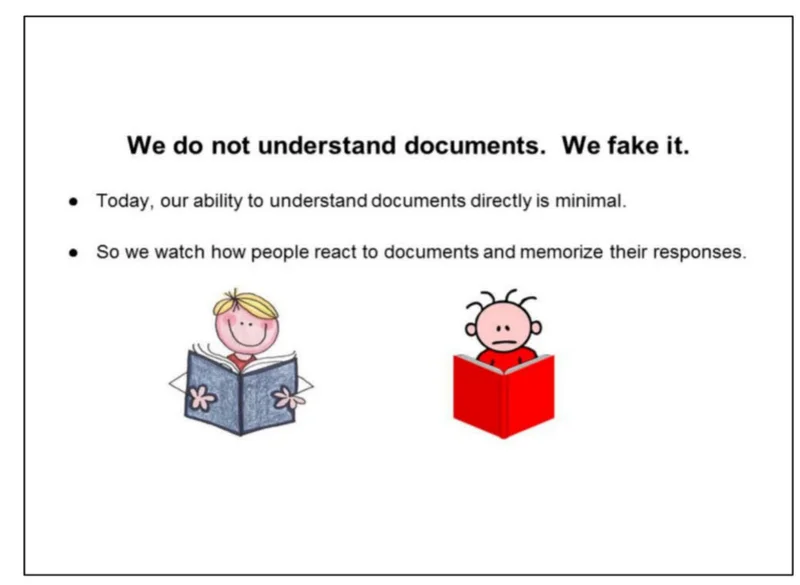

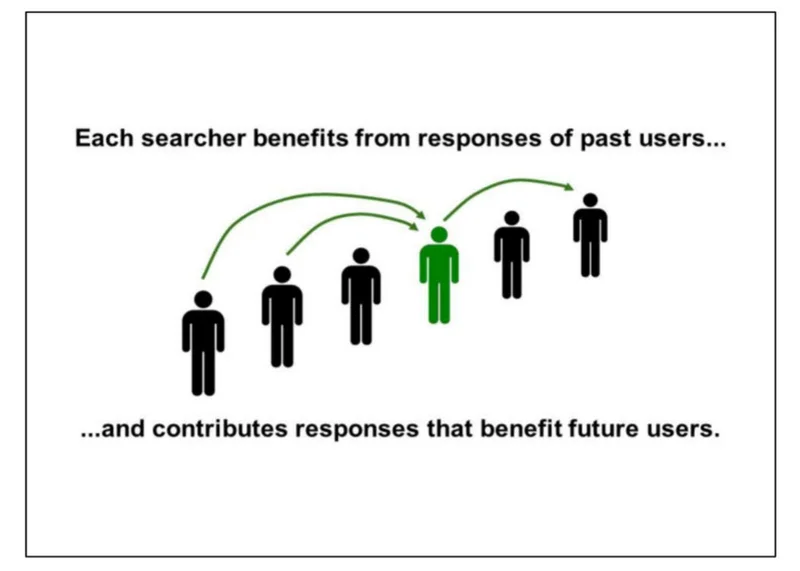

This was written before the invention of the transformer, which sparked the new age we live in today - one where AI is used to understand language and transform data into something helpful.
What I’m trying to say is that I believe that the launch of Gemini 2.0 in December of 2024 ushered in an improved era of Search. We will likely see similar changes as we have been seeing throughout 2024. We will see more and more that it’s not SEO that makes pages rank, but rather, having pages that people tend to choose and go on to find to be their satisfying answer.
It is interesting that the March core update happened in conjunction with spam updates, and the December core and spam updates launched one after the other. I expect that the new changes that came with the use of newly improved machine learning systems (Gemini 1.5 and then Gemini 2.0) bring new opportunities for spam to surface. Therefore, there's more need to algorithmically detect and neutralize spam. If you've seen a rise of spam in your results in the last few weeks I expect this will improve as the systems learn.
What if you were impacted by the spam update?
If you truly have seen a significant decline in keyword rankings and traffic in conjunction with the December 19-26 spam update, you may find that recovery is difficult. This would mean that your previous success came because you've found ways to trick the algorithm rather than because of the quality of your content.
I’d encourage you to review each of the things listed in the spam policies. I won’t list them all here, but rather a few that may possibly be the focus of this recent update:
- Doorway pages: Do you have many similar pages, each optimized for a very specific search, that really could be combined into one?
- Scaled content abuse: This is not just about AI, but sites using AI to pump out content are most likely to be impacted here. If you’ve published many pages with AI that get little engagement and likely are rarely the satisfying answer searchers choose, it may be worth culling those pages. In some cases, it's possible that AI content gave you more of a boost than it should have and these updates have corrected Google's predictions.
- Thin affiliation: Google is not against affiliate content, but your content must be adding value to what already exists on the web. Do you have information that truly can’t be found elsewhere? Or are you just aggregating what already exists. If it’s the latter, removing this content is probably a good idea. Or better yet, improve these pages drastically so that they offer more to the searcher than they could find elsewhere.
Google has not said this was a link related update. With that said, every time AI gets better at understanding intent and which content meets that intent, it seems that pages that previously benefitted from link building for SEO purposes suffer. I do not think that disavowing links will help.
Google also has said that this spam update is not related to the site reputation abuse policy.
I want to reiterate that many sites that think they have been impacted by the December spam update have not been. If you are still able to rank decently for some non-branded keywords, most likely you’ve been impacted by ranking changes, but not suppressed because of spam.
What if you’ve been impacted by the December core update?
This is a tough one. Once again, there is a good chance you haven’t been demoted, but rather, the ranking systems have changed in a way that favours other content.
I’d encourage you to look at the pages that have declined in clicks. Search for the keywords that they should rank for. Put yourself in the shoes of a searcher and ask, “Why would they prefer the pages or SERP features ranking ahead of mine?” This is hard to do.
In some cases, there may not be a fix. If you have a page that answers a simple question and now an AI Overview is answering that question, no amount of optimization is going to make the majority of searchers click through to your site. On the other hand, if webpages have crept above you, ask yourself why.
- Is the answer easier to find? If so, modify your page so that the answer they are looking for is more obvious.
- Is the layout more modern or easy to navigate?
- Is the answer given in the form of a chart, image or video? Can you do better?
- Is your page difficult to read because of ads? It’s ok to have ads, but if your page offers a much worse experience than competitors that’s going to be reflected in the user engagement signals.
- Does their page look more trustworthy? If so, can you improve yours?
- Are they a more recognizable brand? This is a tough one. You may need to work on improving your reputation by going on podcasts, getting quoted on authoritative sites and possibly even improving your social media presence.
Your answer is not likely a simple one. For some sites, if the losses are significant, it may mean that people are turning to other sources and getting their answers from AI or social media. Your goal will be to determine how you can provide the absolute best resource for people. This usually involves drawing from your experience.
For most sites with losses, there will also be keywords and pages with improvements. I’d encourage you to look at those. Ask yourself why they did well.
- Are they more in line with your area of expertise?
- Do you answer a question better than others can?
- Do they have helpful charts, images, video or audio?
- Are they written in a different tone?
You can try these prompts in ChatGPT or Gemini. I prefer using the latest model of Gemini in AI Studio.
Here is my page [paste in the entire page and also add a full page screenshot] and here is a competitor’s page [paste it in and add full page screenshot.] Give me 10 reasons why people who have searched for [keyword] might find my competitor more helpful? Give me ideas for improving the helpfulness of my page.
or
Here is a page on my site that did well recently [paste it in and add screenshot] for the keyword [keyword]. And here is another page that did not do so well for the keyword [keyword]: [paste the page and screenshot]. Can you see any differences? List 10 reasons why searchers may prefer the first page and not the second.
You may find some inspiration in the answers.



Comments are closed.